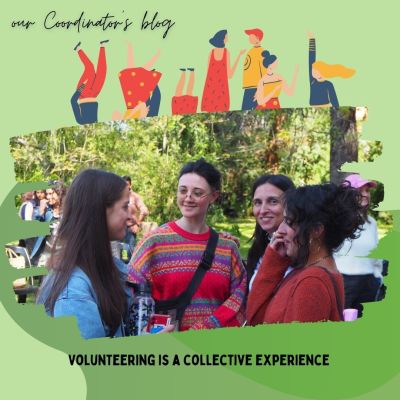Valeria Gracia is one of the founders and the institutional coordinator at Voluntario Global, she is in charge of visiting organisations, keeping a check on all of the projects, and ensuring that everyone in the network is connected. Valeria has always been a woman who loves to spend her time helping others. It all began when she started to visit the local shanty towns on a Saturday along the outskirts of Buenos Aires and on each visit Valeria would sit with the youths and help them pass their classes and do their homework. She was initially concerned that only visiting on a Saturday was not enough, but as Valeria was working in a hostel in the week, she could only find the time to visit on a Saturday. Upon talking to many travellers whilst working at the hostel, Valeria discovered that people were interested in coming along to the shanty towns with her. The travellers wanted to help where they could and also get a different perspective of the city so, she happily accepted their offer and began to bring the travellers from the hostel to the shanty towns. She expressed how useful and helpful the travellers became, for example, the travellers from Germany were able to teach the children mathematics, without the need to speak Spanish.
This bridged a large gap in the youth’s learning, as the majority of teachings were about social issues. Over the course of a few months, Valeria began to take more and more volunteers with her to the shanty towns and the difference it made was incredible, the kids were connected and paid attention. Nobody felt that they were superior, and everyone was accepted and welcomed, up to the point of families inviting the volunteers (travellers) for dinner and attending lunches before classes.
Valeria thought that it would be a good idea to begin bringing volunteers in the week to the shanty towns, not just for helping out the youth’s but also for understanding the reality for the children. Valeria explained, “If we keep the communication with others, it is the best way to change and improve things”. She proposed the idea of Pacheco to the community and they all agreed it was a brilliant idea and began building the project. They all worked on building a solution together.
“Pacheco was then born with the ideology to help young people to go on studying, to find a job, or something productive,” Valeria expresses, she also goes onto explain the difficulties that the youth’s face once they finish high school, “the youth’s are not sure what to do after, if they want to study they can’t because they would need a job to support themselves, and their family cannot help them as it is too expensive. The jobs are 9 hours per day and then it is impossible to study, if they do find a job, it is not well paid”
And this is where Pacheco comes in, Valeria and her team prepare the young people with specific skills to help them get jobs in areas such as gardening. Pacheco have the tools and the equipment to teach the children in the area and they are able to rent the machines to use in their own lines of work. They are all learning, the idea is that their training will teach them an effective way of working, not only by themselves but with others as well. Valeria expresses that, “working is not something that should be a nightmare, it is something that can be enjoyed! The kids will say that, “Today is a happy day!” and I would say “Yes, and you are working! It should not be a crazy idea that working and happiness are associated together.” It is something that everybody strives for and it is important to hold this as a key part of the programme. The kids are working in harmony with others and do not see them as their competitors”
We asked Valeria how she was able to attract people to the project, she believes that it helped hugely that she was previously visiting the shanty towns and she knew the community. She stated that politicians will go to the shanty towns, perhaps once a year, and go with various different promises. These promises are never met and the people that live in the shanty towns do not necessarily trust these politicians. This is why Valeria’s visits to the shanty towns are so important, she was able to connect with the people, discover the problem and find a solution.
One of the great things about Pacheco is that the youth’s are able to create their own rules as Valeria believes it’s important to give them the opportunity to create rules for themselves. The parents of the children are also extremely interested in the Pacheco project that they would also like to join in! Valeria and the coordinators are planning to offer one day a week for the parents of the students to come to Pacheco and learn about gardening, and the best part is that their own children will be their teachers. The youth’s also have the opportunity to go back to Pacheco once they have received their diploma, for example, two of the students from last years project are now coordinators for the new pupils, helping them learn and grow.
Valeria became very conscious about the importance of changing habits as human beings. The goal of Pacheco is always changing with the interests of the people, they do not have a set plan for the future other than adapting with the needs of the youth’s and the people in the area. Valeria really believes in the sharing of ideas, many of which came from the volunteers, such as helping the development of the project. The objective is to carry on going forward with Pacheco, meeting others and exchanging ideas, and keeping the network alive, bigger and stronger.





